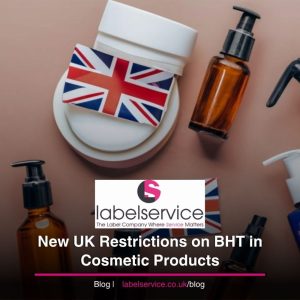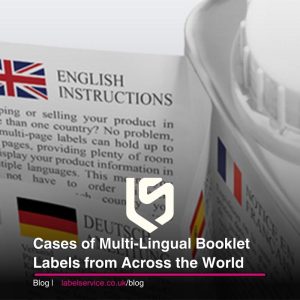The world of labels is changing at every turn. It seems every product’s label is touched to a small or large degree by new regulations. Wine is now in the hotseat as new regulations appear here in the UK and around the world.
If you drink wine, you probably know there is more in the bottle than fermented grapes. Yet, you likely won’t find those added ingredients listed on the label, nor the wine’s nutritional information. That’s because historically, wine bottles—unlike food products—have not been required to list additional ingredients other than allergens on labels in both the United States and the European Union (E.U.).
E.U’s new Wine Label Regulations
However, that’s changing in the E.U. New regulations now mandate that wine labels include a whole lot more information. But will the U.S. follow suit? Here’s a look at where things stand and what it could mean for the wine industry. On December 6, 2021, the E.U. brought forth a new reform called the Common Agricultural Policy (CAP), which went into effect on January 1, 2023. Full details of how these labelling rules will be enforced—essentially, how producers will prove their labels reflect the truth—have not yet been finalized, but should come out this summer. After a grace period, which runs through December 8, 2023, all wines sold in the E.U. must comply with the new label regulations, including imports.
The new law mandates that wine labels include a full list of ingredients associated with allergies and intolerances, such as sulphites and gluten. (You can view the full list here.) Certain nutritional facts, including calories must also be on the physical label. Other additives and nutritional information (carbohydrates, sugar, protein, etc.) must be provided, too, but can be provided electronically through a QR code printed on the label.
A parallel movement to change wine labels is also afoot in the U.S. In 2022, the Centre for Science in the Public Interest (CSPI) and National Consumers League were victorious in a lawsuit against the Alcohol and Tobacco Tax and Trade Bureau (TTB) for failing to act on a petition they filed in 2003 calling for better alcohol labelling laws. CSPI is a Washington, D.C.-based non-profit organization and consumer advocacy group that advocates for safer and healthier foods.
“The TTB has agreed to issue proposed rules requiring standardized alcohol content, calorie and allergen [labelling] on all beer, wine and distilled spirits products [and to] begin preliminary rulemaking on mandatory ingredient labelling,” said CPSI in a press release in November of last year. This was a significant win. Apart from adding the surgeon general’s warning in 1988, current wine labelling requirements in the U.S. have, for the most part, remained unchanged since 1935.
Now, the E.U. rule change is helping to further shift public sentiment in the U.S., says Matthew Simon, deputy litigation director at CSPI. “There’s a momentum, as more than ever consumers demand to know what is in their products,” he explains. Simon believes that a major sea change is afoot as more bottles imported to the U.S. from E.U.-based wineries begin to bear new information laden labels. Mainstream American consumers will start to question the absence of such information on domestic bottles, Simon believes, which could help further clear the path for stateside legislation.
As things stand now, Simon expects new labelling suggestions from the TTB to come out later this year. Of course, “then stakeholders need to comment, the TTB has to then make tweaks and there will be a lag until the companies need to follow.” In other words, it’s going to be a while before U.S. consumers start seeing any changes reflected on wine labels.
“Generally speaking, I support this, but I wonder what the rules will look like and whether they will create difficulties for growers who run smaller wineries,” says Jorge Riera, wine director at the popular Frenchette and Le Rock restaurants in New York. Martha Stoumen, owner of her eponymous winery in California, shares a similar concern. “It will hurt [small businesses] more,” she says. Stoumen adds that compliance needed to sell alcohol already represents a burden. “Last year, 15% of my overhead expenses paid just for compliance, and we still do a good amount of the work ourselves to minimize the cost.”
Some like Pascaline Lepeltier, sommelier and co-owner of the New York City restaurant Chambers and partner at Chëpìka, a Finger Lakes wine project, also question whether it’s fair to use QR codes. Yes, the majority of people may have smartphones, but Lepeltier worries about those who may not. Those consumers should also be able to access nutritional information, she believes. Yet, despite all the potential hardship, Lepeltier and others with qualms about potential new regulations are on board. “This is a subject close to my heart, and I am for it,” says Lepeltier. She believes that if wine producers “are not putting anything harmful in there, they shouldn’t be afraid to put this on the label.”
Ireland’s Wine Label Changes
Ireland has its own law on new alcohol labels. The Irish government announced this by making it public on the executive website www.gov.ie that “Health minister Stephen Donnelly has signed the Public Health (Alcohol) (Labelling) Regulations 2023 and the remaining provisions of Section 12 of the Public Health (Alcohol) Act”. Section 12 and the Regulations are those that “introduce comprehensive health labelling of alcohol products sold in Ireland and provide that similar health information is available to customers of licensed premises”.
The Irish alcohol label has drawn criticism from several EU states, including Italy, from WTO member states and alcoholic beverage producers as a barrier to trade, “unjustified and disproportionate”. The European Commission, however, has given the green light to the Irish proposal through silent consent, despite criticism from 13 states including Italy. The issue will be on the agenda of a June 21 meeting of the Technical Barriers to Trade Committee.
The law, the government memo points out, “requires that alcohol product labels indicate the calorie content and grams of alcohol in the product. The labels will warn of the risk of alcohol consumption during pregnancy and the risk of liver disease and fatal cancers due to alcohol consumption. The labels will direct consumers to the Hse website, www.askaboutalcohol.ie, for more information. The law provides a three-year period to give companies significant time to prepare for the change. The law will apply as of May 22, 2026”.
“I am pleased that we are the first country in the world to take this step and introduce full health labelling of alcohol products: I hope that other countries will follow our example -underlined minister Donnelly-. This law is designed to give all of us consumers a better understanding of the alcohol content and health risks associated with alcohol consumption. With this information, we can make an informed decision about our alcohol consumption. The packages of other food and beverage products already contain health information and, where appropriate, health warnings.”
“Everyone has the right to be informed about the risks associated with a product before consuming it -adds Hildegarde Naughton minister of Welfare and National Drug Strategy-. This law is designed to ensure that all alcohol consumers have access to clear and concise information about the risks of alcohol. The medical evidence is clear that cancer risk exists even at lower levels of alcohol consumption”.
In 2019, according to data from the Global Burden of Disease, 4.8% of all deaths and 5.2% of life years in people with disabilities were attributable to alcohol. The average length of hospital stays for patients with alcohol-related diagnoses has increased from 6 days in 1995 to 10.3 days in 2018: this, according to the Irish government, suggests that the diseases are becoming more complex and take longer to treat.
Australia targeting youth
McGuigan owner Australian Vintage has launched an alcohol-free wine brand in a bid to lure younger shoppers. Called Not Guilty, the brand is launching with three variants: Pinot Grigio, Red Blend and Rosé (rsp: £6/70cl). All three have an abv of less than 0.05%.
Pinot Grigio was “fresh and fruity, with a crisp finish”, the brand said. Red Blend, meanwhile, offered a “bold ripe berry flavours”. Finally, Rosé provided “citrus and rose petal aromas, mixed with fresh strawberries”. Pinot Grigio and Rosé will roll into Morrisons on 17 April. All three wines will hit Asda shelves on 15 May, while Pinot Grigio and Red Blend will be listed at Tesco from 29 May.
The wines were made for millennials and gen Z shoppers who didn’t “need to hide behind their decision to not drink alcohol”, said Not Guilty. “We know there is a growing consumer appetite for zero-alcohol wines, and we wanted to make a range that encourages our gen Z consumers to have fun on their own terms, without compromising on quality or taste,” said Australian Vintage chief operating officer Julian Dyer.
Also, Australian Vintage has expanded its McGuigan wine brand with the launch of the premium Gold Label range. The supplier says the new range combines accessibility and premium quality for shoppers looking to trade up for at-home consumption. It is available in Shiraz and Sauvignon Blanc varieties, launching initially in Sainsbury’s each at an RRP of £10. The supplier said it is planning to list the range with wholesalers and symbol groups.
According to research from Wine Intelligence, the share of spend of premium wines priced from £8 to £10 is growing among 35-55-year-olds. “We are seeing a growing trend for premium wines, particularly trade-ups with brands consumers trust,” said Oliver Hoey, brand manager at McGuigan Wines. “We believe everyone should have the opportunity to enjoy a touch of luxury, and the McGuigan Gold Label collection embodies that ethos.”
Ja Rule not just about music
Rapper Ja Rule ventures into the world of premium wines with the launch of his Rose Vine Cellars label, its first bottle retailing for a cool US$100. The Always on Time singer might be new to the world of wine but if his new collection is anything to go by he already has his finger on the pulse of evolving wine regions.
California’s Alexander Valley AVA, just north of Healdsburg in Sonoma County, was once associated with bulk wines, but in recent years has undergone a premium transformation, with E & J Gallo snapping up substantial amounts of Alexander Valley land to establish its fine wine brand. In 2015 Gallo bought a further 200 hectares in Alexander Valley when it acquired Asti winery from Treasury Wine Estates. Now Ja Rule has teamed up with Ross Reedy, director of winemaking at Truett Hurst winery and VML Wines, and wine marketing company Wines That Rock to launch his Rose Vine Cellars label.
To kickstart his wine business, the rapper has released two high-end Alexander Valley expressions; Red Rose Cabernet Sauvignon 2019 (US$100) and an Autographed Limited Edition bottle dipped in red wax (US$150), both of which are offered as a set for US$250. “This launch is near and dear to my heart; one of my favourite things to do after a long day is pour myself a nice glass of wine,” said Ja Rule.
“This collab with wine master Ross Reedy and Wines That Rock is something we’ve spent a lot of time on because we wanted it to be perfect. Our goal was to create something unique, sophisticated and luxurious, and this collection is exactly that. I’m very proud of what we’ve accomplished.” The Cabernet Sauvignon hails from 60-year-old vines in Alexander Valley, and according to Rose Vine Cellars boasts “rich notes of blackcurrant, cherry and dark chocolate, all balanced with velvety tannins.” It has been aged for 24 months in French Oak. Winemaker Reedy studied Wine and Viticulture at Cal Poly San Luis Obispo, while also working at a boutique winery in Paso Robles.
The Healthy Ireland survey, conducted annually and based on a nationally representative sample of more than 7,000 respondents, shows that a significant number of Irish consumers are unaware of the risk of health damage from alcohol consumption. Despite all this, European and national wine, beer and spirits producer associations last week submitted official complaints to the EU Commission to open infringement proceedings against Ireland.

















